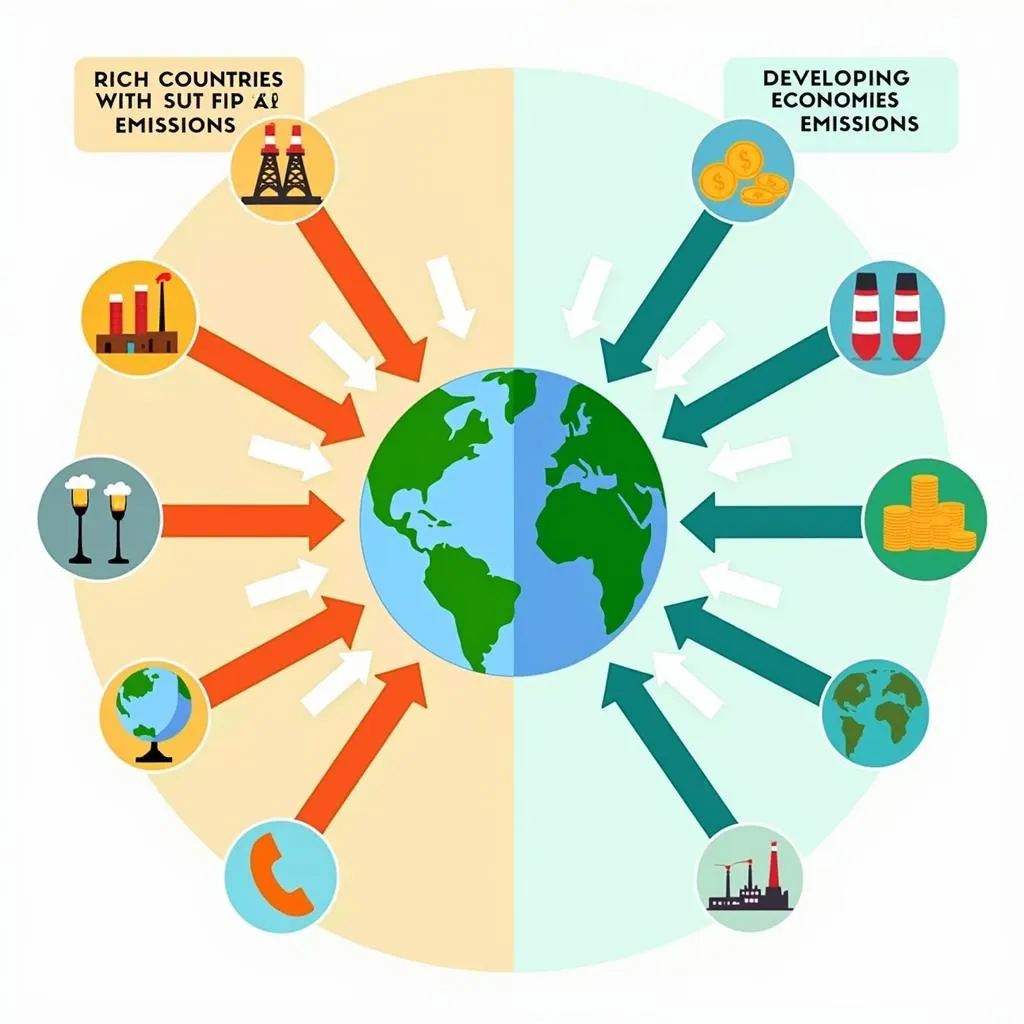The topic of global economic policies and their impact on developing countries is a recurring theme in IELTS Writing Task 2. Based on analysis of past exam questions and trends, this subject has appeared frequently and is likely to continue being a popular choice for examiners. Let’s examine a relevant question that has been featured in recent IELTS tests:
Some people believe that developed countries have a higher responsibility to combat climate change than developing countries. Others say all countries should have the same responsibilities towards climate change, regardless of their economic situations. Discuss both views and give your opinion.
This question perfectly encapsulates the interplay between global economic policies and their impact on developing nations, particularly in the context of climate change. Let’s analyze the question and provide sample essays for different band scores.
Question Analysis
This question requires candidates to:
- Discuss the view that developed countries have more responsibility in combating climate change
- Discuss the opposing view that all countries should have equal responsibilities
- Provide their own opinion on the matter
Key points to consider:
- The economic disparity between developed and developing countries
- The historical context of industrialization and carbon emissions
- The current capabilities of different nations to address climate change
- The global nature of climate change and its impacts
Sample Essay for Band 8-9
Climate change is undeniably a global crisis that requires collaborative efforts from all nations. However, the debate on whether developed countries should bear a greater burden in tackling this issue compared to developing nations is a contentious one. In my opinion, while all countries must contribute to climate change mitigation, developed nations should indeed shoulder a larger responsibility.
Proponents of equal responsibility argue that climate change affects all countries indiscriminately, necessitating a unified approach. They contend that every nation, regardless of its economic status, should implement stringent measures to reduce carbon emissions and promote sustainable practices. This viewpoint emphasizes the urgency of the climate crisis and the need for immediate action from all global players. Furthermore, advocates of this stance believe that holding all countries equally accountable would foster a sense of global unity and prevent any nation from evading its environmental obligations.
On the other hand, those who support greater responsibility for developed countries present a compelling case based on historical and economic factors. Developed nations have contributed significantly more to greenhouse gas emissions over the past century due to their early industrialization and prolonged periods of unchecked pollution. This historical context suggests that they should take the lead in remedying the environmental damage they have largely caused. Moreover, developed countries possess superior financial resources and technological capabilities to implement large-scale green initiatives and support the transition to renewable energy sources.
In my view, while universal participation is crucial, developed countries should bear a higher responsibility in combating climate change. This approach acknowledges the principle of “common but differentiated responsibilities” established in international climate agreements. Developed nations can demonstrate leadership by setting more ambitious emission reduction targets, providing financial assistance to developing countries for climate adaptation, and facilitating technology transfer to support sustainable development in less economically advanced regions.
The impact of a global currency on international trade could provide insights into how global economic policies affect developing nations’ ability to address climate change. Similarly, understanding how renewable energy can create new job opportunities is crucial for developing countries seeking to balance economic growth with environmental protection.
In conclusion, while all countries must actively participate in the fight against climate change, it is both ethical and practical for developed nations to assume a greater share of the responsibility. This approach not only addresses historical injustices but also leverages the capabilities of those best equipped to drive meaningful change, ultimately benefiting the global community in our collective battle against climate change.
(Word count: 407)
 Global economic policies affecting developing countries
Global economic policies affecting developing countries
Explanation of Band 8-9 Score
This essay would likely receive a Band 8-9 score for the following reasons:
-
Task Achievement: The essay fully addresses all parts of the task, discussing both viewpoints and clearly presenting the writer’s opinion.
-
Coherence and Cohesion: The essay is well-organized with clear paragraphing and effective use of cohesive devices. Ideas flow logically from one paragraph to the next.
-
Lexical Resource: The essay demonstrates a wide range of vocabulary used accurately and appropriately. Complex phrases like “contentious one,” “stringent measures,” and “compelling case” are used effectively.
-
Grammatical Range and Accuracy: The essay showcases a wide range of grammatical structures used accurately. Complex sentences are used throughout, with only minor errors that do not impede communication.
-
Critical Thinking: The essay presents a nuanced argument, acknowledging the complexity of the issue and providing thoughtful reasoning for the writer’s opinion.
Sample Essay for Band 6-7
Climate change is a big problem that affects everyone in the world. Some people think that rich countries should do more to fight it, while others believe all countries should do the same amount. I think both ideas have good points, but rich countries should probably do more.
People who say all countries should do the same think it’s fair. Climate change is hurting everyone, so everyone should help fix it. If all countries work together equally, we might solve the problem faster. Also, if some countries don’t have to do as much, they might not try hard enough to help.
On the other hand, people who think rich countries should do more have good reasons too. Rich countries have been polluting for a longer time because they built factories and used lots of energy earlier than poor countries. They have more money and better technology to help fight climate change. Poor countries are still trying to develop and might not be able to spend as much money on being green.
How to tackle economic inequality through taxation is an important consideration when discussing the responsibilities of developed versus developing nations in addressing climate change. Additionally, understanding the pros and cons of implementing a global digital currency could provide insights into how economic policies affect different countries’ abilities to combat environmental issues.
I think rich countries should do more to fight climate change, but poor countries should still help. Rich countries can set a good example by reducing pollution a lot and helping poor countries with money and technology. Poor countries can do their best to be green while they grow. This way, everyone is working together, but in a fair way that matches what they can do.
In conclusion, while all countries need to help fight climate change, I believe rich countries should take on more responsibility because they have more resources and have caused more pollution in the past.
(Word count: 324)
 Climate change responsibilities: Rich vs Poor countries
Climate change responsibilities: Rich vs Poor countries
Explanation of Band 6-7 Score
This essay would likely receive a Band 6-7 score for the following reasons:
-
Task Achievement: The essay addresses all parts of the task, discussing both viewpoints and presenting the writer’s opinion. However, the ideas are less fully developed compared to the Band 8-9 essay.
-
Coherence and Cohesion: The essay has a clear structure with introduction, body paragraphs, and conclusion. However, the use of cohesive devices is less sophisticated than in higher band essays.
-
Lexical Resource: The essay uses a mix of simple and more complex vocabulary. While there is some good use of topic-specific language, the range is more limited than in the Band 8-9 essay.
-
Grammatical Range and Accuracy: The essay uses a mix of simple and complex sentences. There are fewer complex structures than in the Band 8-9 essay, but the grammar is generally accurate.
-
Critical Thinking: The essay presents a clear argument and shows some analysis of the issue, but the ideas are less nuanced than in higher band essays.
Key Vocabulary to Remember
- Climate change (noun) – /ˈklaɪmət tʃeɪndʒ/ – Long-term changes in temperature and weather patterns
- Developed countries (noun phrase) – /dɪˈveləpt ˈkʌntriz/ – Economically advanced nations
- Developing countries (noun phrase) – /dɪˈveləpɪŋ ˈkʌntriz/ – Nations with a lower level of economic development
- Responsibility (noun) – /rɪˌspɒnsəˈbɪləti/ – The state of having a duty to deal with something
- Emissions (noun) – /ɪˈmɪʃənz/ – The production and discharge of something, especially gas or radiation
- Sustainable (adjective) – /səˈsteɪnəbl/ – Able to be maintained at a certain rate or level
- Industrialization (noun) – /ɪnˌdʌstriəlaɪˈzeɪʃn/ – The development of industries in a country on a wide scale
- Mitigation (noun) – /ˌmɪtɪˈɡeɪʃn/ – The action of reducing the severity, seriousness, or painfulness of something
- Collaboration (noun) – /kəˌlæbəˈreɪʃn/ – The action of working with someone to produce something
- Renewable energy (noun phrase) – /rɪˈnjuːəbl ˈenədʒi/ – Energy from a source that is not depleted when used
Conclusion
The topic of global economic policies and their impact on developing countries, particularly in the context of climate change, is a complex and important issue in IELTS Writing Task 2. By understanding the nuances of this topic and practicing with sample essays like those provided, you can improve your ability to write strong, well-structured responses.
As you prepare for your IELTS exam, consider practicing with similar topics such as:
- The role of international organizations in supporting developing economies
- The impact of trade policies on environmental protection in developing countries
- The challenges of implementing green technologies in emerging economies
Remember to analyze the question carefully, plan your response, and use a range of vocabulary and grammatical structures appropriate to your target band score. Feel free to practice writing your own essay on this topic and share it in the comments section for feedback and discussion with other learners.


